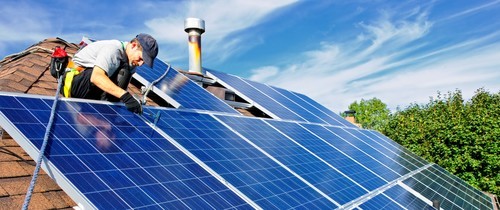Many homeowners today are considering harnessing the power of the sun in the form of solar power. While solar panels have become an increasingly common sight on south-facing roofs across the country, Tesla and a few other companies have started production of cutting-edge solar shingles as an alternative to solar panels. We explain the differences between them so that you can make an informed decision.
Description
Solar panels contain crystalline silicon solar cells, which are arranged in a rigid black panel, and are installed above the shingles on a roof. The cells generate electricity that can be used by the household or sold to a power company and then distributed in the electrical grid. The electricity can also be stored in batteries for use when the sun is not shining.
Solar shingles, on the other hand, are a newer technology. The solar cells are actually in the shingle itself, so the solar shingle has two functions: to protect the roof as any shingle would and to generate electricity, which can then be used or stored just like the power from a solar panel.
Appearance
Tesla’s solar shingles have been designed not just with efficiency in mind but also with aesthetics. They have four different designs, including textured, which is similar to asphalt shingles, Tuscan, slate, and smooth, making them suitable for a wide range of architectural styles.
Solar panels, on the other hand, will always stand out from your roofing material because they are a separate, rigid panel installed above the roof surface. If you are looking for solar power that also looks good, solar shingles are the better choice.
Efficiency and Versatility
While Tesla’s roof tiles may be more appealing from a design standpoint, their efficiency could be limited by your roof’s angle or the amount of sun that hits your roof. Overhanging trees or a neighboring building shading your roof will interfere with electricity production. Also, if your roof’s slope is not optimal, the amount of power generated will be affected.
Solar panels can be angled to gather the most solar energy possible, either by being fixed permanently or with a mechanism that will track the sun throughout the day and allow for adjustments at different times of the year. Even if you have a flat roof, angled solar panels are a viable method of producing power. You can also place solar panels elsewhere on your property for maximum power generation, while solar shingles can only be installed on your roof.
Installation
Installing solar panels involves many steps, and it is important to ensure that the roofing underneath will last as long as the panels, which is about 10 years. You do not want to pay to have the panels removed, the shingles underneath replaced, and then the panels reinstalled. If you need to install a new roof, a metal one will provide the best longevity. The actual installation process takes 2-5 days, but you will have to first obtain a building permit and get electrical inspections. When the panels are ready to put in place, the frame is first bolted to your roof, and then the panels are attached to the frame. After that, the system is hooked up to the power inverter or storage battery. If you move, you can remove the panels and take them with you to your new home.
The advantage of solar shingles is that they perform two functions at once, protecting your roof from the elements and generating power. You need to find a professional to install them, and it may be challenging to find solar installers who will give you a quote for solar shingles. Tesla solar shingles, for example, are installed exclusively by SolarCity. It may take as little as 10 hours for the installation of solar shingles on your roof. Good-quality solar shingles snap together, making them quicker to install and requiring fewer holes in your roof. Once they are on the roof, however, removing them is probably not a viable option.
Costs
Installing a 5-kilowatt solar panel system to power a 2,400-square foot home will cost between $10,000 and $37,000. The panels cost around $5,000 and labor adds another $2,250. You also have to pay $1,500 for the power inverter and $750 for the mounting frame. Permits and inspection fees will add about another $500. Additional expenses can add up to another $5,000, and if you need to replace your existing shingles before installing the panels, that can add up to $15,000 to the price depending on the materials you choose. If you choose to add a storage battery system, that can cost an additional $7,000.
Tesla solar shingles are new and certainly more expensive than solar panels. To power a 2,400-square foot home, materials and installation will cost $65,550. If you add a Tesla Power wall, that is an extra $7,000, for a total of $72,550.
Longevity
Expect a properly installed solar panel array to last 23-35 years. Tesla claims that their shingles will last 40 years before needing replacement, but that has yet to be proven.
Tax Credits
Federal tax credits are available for both solar panel and solar shingle roofs, depending on the amount of electricity that your system is set up to generate. You are entitled to a federal solar tax credit of 30%, and many state and local governments have additional rebates and tax credits as well.
Resale Value
Solar panels or shingles on your roof can help sell your house. A 5-kilowatt system could add as much as $20,000 to its value, and houses with solar power sell on average 50% faster.

